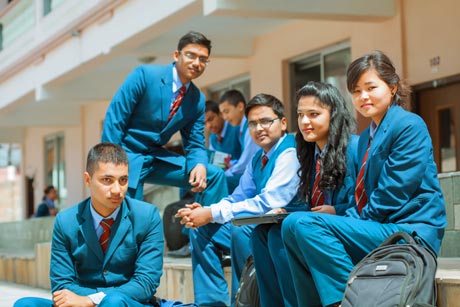Options after SEE

After seven years of planning, the country’s school-level education system was finally restructured after the eighth amendment to the Education Act of 1972 in June last year. With the restructuring, four levels of school level education was replaced by just two. Similarly, the School Leaving Certificate examination will now be held at the end of grade 12, instead of 10, as had been the norm for the past 82 years. In the new school set-up, students this year took Secondary Education Examination at the end of grade 10 and are now looking for Higher Secondary School and courses that best suit their career objectives.
As per the new legal provisions, the Central Examination Board will conduct grade 12 examinations, while its sub-ordinate offices will hold the grade 10 examination at the provincial level starting next year. The government has also adopted a Grade Point Average (GPA) system for evaluation, replacing the traditional percentage system. Those securing GPA 1.6 and above can join regular streams of higher education, while the ones failing to do so will have to take up technical courses.
Students aspiring to take science, management, humanities, law or education as their major will have to secure earmarked grades in certain subjects, while there also are various requirements for students wanting to enroll into different programmes under the technical category. As is, students who completed their SEE examinations have three options for the higher studies: First, joining grade 11; second, taking technical and vocational course; and third, opting for international degrees.
Plus Two
Plus Two remains the preferred choice among Nepali students as over 85 percent of eligible students join grade 11 after completing their 10th grade examinations. As per the decision of the National Examination Board, a student securing a minimum of 1.6 GPA and at least a D plus grade in social studies can take up one of the five streams available in grade 11.
Anyone aspiring to take up medicine, engineering or pure science in the higher secondary level needs to enroll into the science stream. A student needs to have a minimum of 2.00 GPA, in addition to securing C Plus in compulsory Science and Mathematics, and D Plus in Nepali, English and Social Studies to join the science steam.
If anyone aspires to study management, they must have secured a 1.6 GPA, while also obtaining a D Plus grade in English, Mathematics Science, Nepali and Social Studies. For those wishing to take up Humanities, 1.6 GPA is the minimum average grade, while they also need to have D plus in English, Nepali and Social Studies. Students aspiring to enroll into the education stream need to have GPAs equal to the management and humanities stream, the only difference being they need to obtain a D Plus in Social Studies only.
From last year, the government has also added the law stream as an option starting grade 11. The students securing 1.6 GPA and D Plus in English, Nepali and Social Studies can take up law.
Technical courses under CTEVT
The students who received GPAs lower than 1.6 will have to take up technical and vocational courses that are a year to 18 months long. Under the 18-month course, students can study to become sub-overseers in civil electrical and mechanical engineering, or they can take up survey, lab assistantship, entrepreneurship development, ANM, and CMA courses, among others. The Council for the Technical Education and Vocational Training (CTEVT) has allocated 25,000 seats for these courses. Similarly, under the year-long course, students can take up cooking, plumbing, welding, carpentry and wiring, among other available courses.
However, to study the staff nurse course under the CTEVT, students must have secured a 2.0 GPA and C grade in English, Mathematics and Science. Those taking the overseer course need to have a C in Mathematics and Science and a D Plus in English in addition to 2.00 GPA. A student having 2.00 GPA and C Plus either in Mathematics, English or Science can also pursue a Diploma in Agriculture.
International Degree: A Levels and IB
Students who have secured a 3.25 GPA and are willing to take up an international degree also have the option to choose from either General Certificate in Education (GCE) Advanced Levels (A Levels) or International Baccalaureate (IB). Cambridge International AS and A Level, which was initiated in Nepal in 1986, currently has 2,500 students enrolled in its courses in three dozen colleges around the country. International recognition, practical education and a rigorously-updated curriculum has made AS and A Levels a popular choice among Nepali students. Currently, some 2,000 schools in 127 countries across the globe offer A Level courses.
Cambridge international AS and A Levels offer complete flexibility as students can take 55 subjects and a range of assessment options so that schools can choose the study path that best suits their students’ needs. A Level is typically a two-year course and Cambridge International AS Level is typically one year long.
International Baccalaureate (IB) which is an alternative to A Level is a two-year course for students who have completed their grade 10. Different from the A Level course, students are also mandated to attend their class regularly for this degree.
There are six compulsory courses in IB, among which three are higher levels, while the rest are standard level courses. The course which currently is being offered only by Ullens School, Khumaltar, will now be offered by Premier International School as well.
Upon completion of this course, students can pursue their bachelor’s in Nepal or choose to go abroad. IB programme was started in Geneva, Switzerland in 1968 as a non-profit educational foundation. The mission of this course is to develop inquiring, knowledgeable and caring young people “who help to create a better and more peaceful world through intercultural understanding and respect.”
source: Ghimire, Binod (2017),"Options after SEE",the kathmandu post, 21 June 2017
photo" DAV College
Posted on: 2017-06-21






























